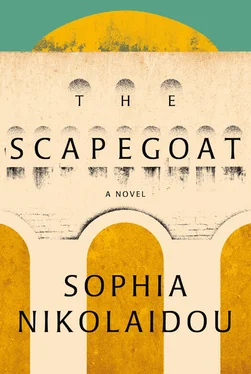ONE TEST IS ENOUGH
Teta had planned to camp out at the entrance to the school with the rest of the mothers, but Evthalia dissuaded her.
— All you’ll do is annoy him, she warned. Can’t you just wait it out? Go out on the balcony and wait.
Some students had brought pens that the bishop himself had blessed. Others were wearing their baptism crosses, while the more extreme carried icons of saints. Minas, meanwhile, had on his lucky underwear, blue with Japanese manga characters. His grandmother had secretly splashed a drop of sainted water into his glass of orange juice that morning; you never know what might help, and it was no time to be closing any doors.
Evelina was standing in front of Agia Sophia. They hadn’t arranged it ahead of time, but they left the house at the same time and looked for one another in the street, to walk over together.
Minas grabbed her cheeks with both hands and gave her a quick kiss. His pants hung below his hips and the laces were loose on his Converse hi-tops.
— Just think about summer vacation, he whispered to her as they walked through the gate.
He reached out a hand and squeezed her hip.
— Pimplimi , she said, quoting the ancient Greek present transitive for fill .
— Gemo and plitho , he quoted back the two possible intransitive versions of that verb, with his usual confidence in his ancient Greek, and they laughed conspiratorially.
Evelina Dinopoulou, Minas Georgiou. They were sent to neighboring rooms.
The exams would be distributed in ten minutes.
The mothers were frantic, the students chewed their pens, trying to concentrate. The whole place buzzed with nerves.
Tasos, meanwhile, watched as the danger marched toward them. At the newspaper and out in the streets, he took the city’s pulse. Anyone with eyes in his head could see. Decisions were being made and those making them were thousands of kilometers away, playing Stratego and Monopoly; they’d set out the pieces and were rolling the dice.
If you looked down Agia Sophia Street toward the water, you would see a snippet of the tranquil sea that hugged the city. It was a bright, beautiful day. Old folks with bypasses were out taking their constitutionals along the waterfront. Others lazed in the sun. Spring was in the air.
On a day like this, living here felt like a privilege, not a prison sentence or a curse.
AND ALL THAT MIGHT HAVE BEEN
If Greece were a country where silence wasn’t hereditary, like genetic material.
If Gris had a protector.
If Greek politicians had more backbone and the great powers less of a tendency to impose their will.
If money and influence — that is, everything — hadn’t been at stake.
If the past taught us lessons; if there were play, fast forward, and rewind buttons for historical events.
If the answer were single and final.
If passivity in the face of injustice were a crime, and punished as such.
If Georgiou hadn’t given in to common sense.
If Teta had a life and not just a child.
If Dinopoulos aimed for the best case, and didn’t just avoid the lesser of two evils.
If Evthalia’s wishes were commands.
If Soukiouroglou lived his life with his body and not his mind.
Then, perhaps.
“I like my country,” the villager told the CBS correspondent. The statement seemed entirely logical and made no particular impression on the foreigner. He looked across the way at the eternal mountains. Spring was bursting into bloom. It smelled of damp soil and blossoming petals.
A triumphant light.
The American pressed the button.
Click.
He wanted to remember that moment, that place.
A NOTE FROM THE TRANSLATOR
The Scapegoat takes place during two key periods of recent Greek history: the Civil War in the late 1940s and the current financial crisis.
The Greek Civil War (1946–1949) was the final stage of a bitter civil strife that broke out shortly after the Axis occupation (1941–1944). With the support of a full-fledged British military intervention in December 1944, Greek anticommunists ousted left-wing resistance forces from a provisional National Union government. As a consequence, the former resistance fighters faced political persecution and a wave of “white terror” by royalist squads. This situation turned into an open civil war in late 1946: on the one side, the Greek government army, created by royalist officers and other far-right elements, including former Nazi collaborators; and on the other, the Democratic Army of Greece, comprised of former procommunist guerrilla fighters who had meanwhile fled to the mountains. The Greek Civil War was one of the first episodes of the Cold War. After the Truman doctrine was announced in early 1947, the Greek government received financial, military, and political support from the U.S. administration; on the other side, the left-wing guerrillas received a much more reluctant and covert support from the Soviet Union and the neighboring communist states.
In the midst of the civil war, an American journalist for CBS, George Polk (the model for Jack Talas in this book), was killed in circumstances that remain unexplained to this day. Polk was investigating atrocities on both sides, as well as calling the Americans to account for their support of the Greek government. His uncompromising attitude toward the truth has been honored posthumously in the George Polk Award, which is given annually to “intrepid, courageous reporters committed to doing whatever it takes to uncover matters of critical importance to an informed public and the very foundation of democratic society” (from the Polk Award’s website).
After Polk’s death, American diplomats, the military, and journalists placed considerable pressure on the Greeks to close the case. Two members of the Communist Party were accused of the crime, though it was later discovered that one was himself already dead at the time Polk was killed, while the other was not in Greece. The journalist Grigoris Staktopoulos (the model for Manolis Gris) was also accused, quickly tried, and convicted on very thin grounds. He served eleven years of a life sentence, was released in 1960, and died in 1998, having filed a petition in 1977 for the Supreme Court to overturn his conviction, claiming that his confession had been given under torture. His widow filed three more petitions after his death, in 1999, 2002, and 2006, each of which presented new evidence that challenged the prosecution’s case; all three petitions were rejected.
There are other layers of history in The Scapegoat as well. Thessaloniki, the city where the action is set, only became part of the Greek state in 1912, when it passed from Ottoman rule. Ten years later, the failure of an expansionist attempt in Asia Minor brought about 1.5 million Christians, most of them ethnically Greek, to Greece from Anatolia, while some 350,000 Muslims were deported to Turkey. Part of that population exchange involved the survivors of the genocide of Greeks in the Pontus region — among them Staktopoulos’s family. The story Manolis Gris’s mother tells in the novel of her family’s flight to “Salonica” (another name for Thessaloniki, used in this translation to distinguish sections set in the past from sections set in the present) reflects that experience.
The novel’s second central narrative, that of high school student Minas Georgiou, takes place in 2010, in the midst of a financial crisis that has also become a deepening social crisis. Social services in Greece — including the public education system — have been gutted in response to conditions set by the European Central Bank and the International Monetary Fund to loans extended to the Greek government. Minas’s reluctance to attend university can more fully be understood in the context of the bleak unemployment rates and sense of hopelessness facing his generation (in 2010, 33 percent of adults under twenty-five were unemployed; that rate has now reached nearly 60 percent). Many of the chapter titles in the book—“Schools Enlighten Only When They Burn,” “Get Your Hands Off Our Brains,” “Mother, There’s a War On Out There. I’ll Be Late”—are taken from graffiti painted on walls in cities all over Greece in recent years. The sit-in at Minas’s school, meanwhile, echoes the wave of student sit-ins prompted by the murder of fifteen-year-old Alexis Grigoropoulos by a police officer in central Athens in 2008. In the riots that followed Grigoropoulos’s death, Greeks, especially of Minas’s generation, expressed their frustration with the Greek state and the country’s uncertain future.
Читать дальше












